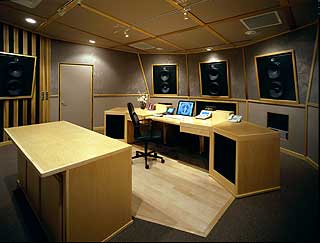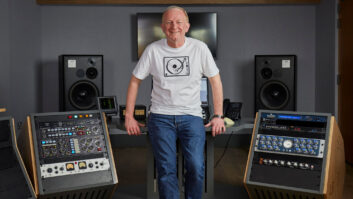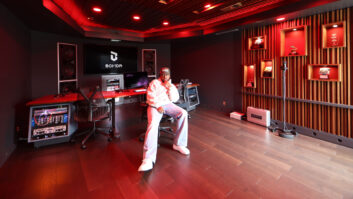
Editor’s Note: This is the second installment in our new online series written by and for mid-level studio owners. On a monthly basis, Studio Unknown owner Kevin Hill and creative director Lisa Horan will be calling around the country and bringing their own expertise to the issues that matter most to a successful studio life. Let’s face it, the middle has been hit hard in the economic downturn, but it’s also the middle that is most likely to come roaring back. This month, in keeping with the theme of our December print edition, Hill and Horan talk to mastering studio owners.
John Polito’s Audio Mechanics
At one point or another in our careers, we’ve all been reminded to develop and perfect our specialty—that one specific area within our field that we do better than anything else. But just how “specialized” are we talking? In the world of mastering, there appears to be a growing trend that takes the already specific niche to an even more finite level. According to the studio owners we interviewed this month, developing a niche can provide a serious competitive edge, but it can also be risky business.
The Path to Niche-Ville—Follow the Connections
So what are we talking about when we refer to niche mastering? Look at it this way: Mastering music is radically different from mastering the audio for a TV show, and mastering audio for a movie is a different animal from remastering a classic film. So exactly what leads an engineer to develop a specific niche within mastering? While the stories of each of the engineers we interviewed varied, there was one common thread among them: Connections were key.
Jeff Dykhouse’s space
Take John Polito, owner of Southern California’s Audio Mechanics, for instance. Polito’s success in motion-picture remastering has been driven by “being at the right place at the right time, and being ready for the opportunities that presented themselves,” he says. The first of these opportunities came right after college when Polito joined a then little-known company called Sonic Solutions. The year was 1986, and Sonic Solutions was pretty much the only company around that offered tools for restoration mastering. During his time there, Polito learned the tools inside and out, even traveling the world to give product demos. When he decided to launch his own company, which centered on mastering music with an emphasis on restoration, the experience he had gained, along with the relationships he had built, gave him a noticeable advantage, and he quickly made a name for himself as the guy to go to for music re-mastering projects. In fact, even mega companies like Disney called on Polito to remaster their records. Eventually, this led to an opportunity to remaster the company’s classic films, and that work led to a connection to UCLA’s Bob Gitt, a pioneer in film restoration, which led to work on a slew of films held at the university. Since then, Polito’s has become the shop that Hollywood TV and film companies turn to when they need audio remastering services. “The pieces all fell into place for me, but a big part of the reason was the fact that I was prepared to take on each challenge,” says Polito, whose recent projects include Alien and How to Marry a Millionaire, as well as the I Love Lucy television series. “I’ve always believed that it’s important to keep my options open and be flexible because you just never know where the industry is going to take you.”
It was no surprise where the industry took engineer Jeff Dykhouse. As a mix engineer for such labels as Vineyard Music, Dykhouse was in constant contact with artists and producers in the Contemporary Christian (CCM) genre. By the time he launched his mastering studio, he had developed such a solid reputation in the genre that he was used almost exclusively to mastering both CCM CDs and instructional music videos. “CCM is different than other types of music in that it is message-oriented and the music has to be delivered in such a way that it doesn’t overshadow the message,” explains Dykhouse, who has worked with such well-known artists as Paul Baloche, Crystal Lewis and Jeremy Riddle. “Because of the success I had had in mixing this type of music and the relationships I had built, artists trusted that I would be able to understand how not to treat their project like typical pop/rock tracks.”
Typical is about as far from Michael Fossenkemper’s niche as you can get. The founder and chief engineer of New York City’s TurtleTone Studios began his career as a mastering engineer with a simple mission: to give offbeat types of projects (avant garde, world, jazz) that usually couldn’t afford mastering a chance to sound good. “When I started out, I did these projects with little expectation of anything really happening—including getting paid,” explains Fossenkemper, who was also a mix engineer at the time. But when word about Fossenkemper’s unique talent quickly spread through the New York City music community, Fossenkemper became so busy with mastering projects that he faced a difficult dilemma. “I knew that, for me, it was impossible to handle both mixing and mastering,” he says. “I just felt they both required a completely different set of ears, and to be really good at one, I’d have to let the other go.” And he did. He took a leap of faith and opened TurtleTone, which specializes in mastering music and DVD concerts of non-mainstream artists, including Flo Rida, Chita Rivera and Coalesce.
Reality Check
Michael Fossenkemper
If the up-side of a niche in mastering is that you can be known as the only guy in town that does what you do, however, the downside is being pigeonholed and being rocked by the impact of any tremors the industry experiences.
Take Fossenkemper, for instance. The audience for the obscure music that he works on is limited, which means limited sales, which means limited fees that he can charge his clients. That said, Fossenkemper has to get creative to give his clients the product they desire for a price they can afford and for a fee that won’t bust a hole in his pocket. “My responsibility is to find a way that my clients can put out a good quality product and still make it make sense from a monetary standpoint,” he explains. “If they aren’t at least able to break even, then they haven’t gotten their money’s worth.” To make sure they do, Fossenkemper is always looking for ways to streamline the process, and he carefully weighs the pros and cons of new technology before jumping on the latest trend. “I am always conducting research and looking at new technology that’s available, testing out new gadgets and figuring out what will be truly beneficial,” he says. “As a small mastering studio, I’ve got to be wise about what I’m spending money on, so I typically only make a purchase if a product will help me do something better than I could do it before.”
While Polito may not be battling with tight budgets to the same extent, his challenges are still tied to his clients’ bottom line. “The time differential between mastering a full-length CD and remastering a full-length film is extreme,” explains Polito, who says that while it takes anywhere from four to eight hours for a CD, it takes from five days to two weeks to remaster a film. As there is no way to cut corners when it comes to the process, Polito makes up the time in other areas. “We use a well-integrated database that contains all elements, project notes, element labels, logs, interstudio memos, workflow charts, et cetera, so that anyone on my staff can look up a project to see what the status is at any given time,” he says. Polito says these types of database-management systems are normally only found at the big studios, but considering that a single film or TV show remastering project can be accompanied by as many as 30 boxes of elements, he felt the investment in an efficient system was wholly justified.
Sometimes, however, even the most careful planning, efficiency measures and credits are no match for a sour economy and mutating industry trends. In spite of being a 20-plus-year veteran of the industry and earning Gold and Platinum RIAA Awards, Dykhouse was no exception. For seven years, he operated his mastering studio from a large industrial space. “Five-hundred-dollar-per-month air-conditioning bills were not out of the question,” says Dykhouse, who is on the desert side of Orange County, Calif. To complicate matters, the explosion of the iTunes revolution and the trickle of singles coming in forced him not only to close the doors on the building and open a mastering studio in a separate space inside a home, but also to diversify his services to supplement his income. “The good news for me is says. In fact, he has yet to meet half of his clients, so while closing the industrial space wasn’t in his original plans, the new setup has worked out well.
“I never intended to develop a niche in mastering,” says Polito. “My focus has always been to do what I do best, the best that I can.” That philosophy seems to embody the successful niche mindset.
Kevin Hill is the owner/engineer and Lisa Horan is the creative director of Studio Unknown, a full-service audio post-production facility and recording studio that specializes in helping clients discover creative sound for film, video, Web, gaming and artist projects.







